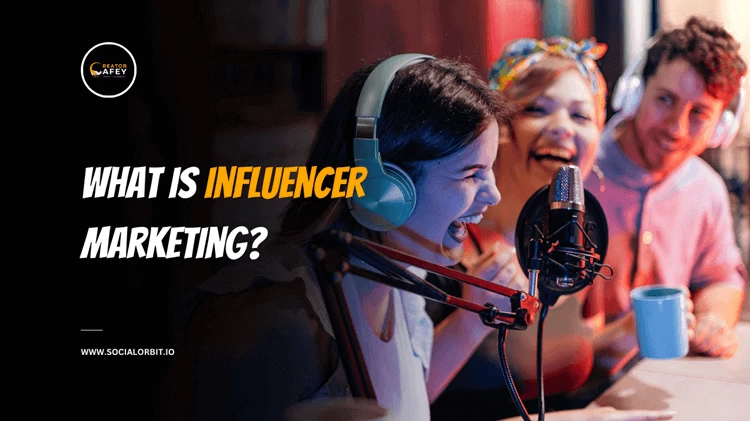In today's digital age, influencer marketing has become a buzzword in the world of advertising and brand promotion. But what exactly is influencer marketing, and why has it become such a powerful tool for businesses? Let's dive into this marketing phenomenon and explore its ins and outs.
What Is Influencer Marketing?
Influencer marketing is a form of social media marketing that leverages the popularity and credibility of individuals who have a dedicated and engaged following on platforms like Instagram, YouTube, TikTok, and Twitter. These individuals, known as influencers, collaborate with brands to promote products or services to their audience.
Key Components of Influencer Marketing:
- Influencers: Individuals with a significant following and influence on social media platforms.
- Brands: Companies looking to promote their products or services.
- Social Media Platforms: The digital spaces where influencers engage with their followers.
- Content: The promotional material created by influencers, often in their unique style.
- Audience: The followers of the influencer who are exposed to the branded content.
Types of Influencers:
- Mega-Influencers: Celebrities with millions of followers.
- Macro-Influencers: Influencers with 100,000 to 1 million followers.
- Micro-Influencers: Individuals with 1,000 to 100,000 followers.
- Nano-Influencers: Those with fewer than 1,000 followers but high engagement rates.
Why Is Influencer Marketing Effective?
- Trust and Authenticity: Influencers have built trusted relationships with their followers, making their recommendations more credible.
- Targeted Reach: Brands can reach specific demographics by partnering with influencers who align with their target audience.
- Increased Engagement: Influencer content often generates higher engagement rates compared to traditional advertising.
- Cost-Effective: Influencer marketing can be more budget-friendly than traditional advertising channels, especially when working with micro-influencers.
According to a report by Influencer Marketing Hub, the influencer marketing industry is set to grow to approximately $16.4 billion in 2022, highlighting its increasing importance in the marketing mix.
How Does Influencer Marketing Work?
- Identify Goals: Brands determine what they want to achieve through influencer marketing (e.g., brand awareness, sales, engagement).
- Find the Right Influencers: Research and select influencers whose audience aligns with the brand's target market.
- Develop a Strategy: Create a campaign plan, including content guidelines, posting schedules, and compensation terms.
- Collaborate on Content: Work with influencers to create authentic content that resonates with their audience while promoting the brand.
- Track and Measure: Monitor the campaign's performance using metrics like engagement rates, reach, and conversions.
Types of Influencer Marketing Campaigns:
- Sponsored Content: Influencers create posts featuring the brand's product or service.
- Brand Ambassadorships: Long-term partnerships where influencers regularly promote a brand.
- Product Reviews: Honest reviews of products provided by the brand.
- Affiliate Marketing: Influencers earn a commission on sales generated through their unique links.
- Takeovers: Influencers temporarily manage a brand's social media account.
Challenges in Influencer Marketing:
- Fake Followers: Some influencers artificially inflate their follower count.
- Disclosure Requirements: Adhering to FTC guidelines for disclosing sponsored content.
- Measuring ROI: Accurately tracking the return on investment can be challenging.
- Maintaining Authenticity: Ensuring influencer partnerships remain genuine and not overly commercialized.
The Future of Influencer Marketing
As social media continues to evolve, so does influencer marketing. Trends to watch include:
- Rise of Video Content: Platforms like TikTok and Instagram Reels are becoming increasingly popular for influencer collaborations.
- Focus on Micro and Nano-Influencers: Brands are recognizing the value of smaller, more niche influencers with highly engaged audiences.
- Long-Term Partnerships: Moving away from one-off collaborations to build more authentic, lasting relationships with influencers.
- Increased Use of AI: Artificial intelligence is being used to match brands with suitable influencers and predict campaign performance.
Conclusion
Influencer marketing has revolutionized the way brands connect with their target audience. By harnessing the power of social media personalities, companies can create more authentic, engaging, and effective marketing campaigns. As the digital landscape continues to evolve, influencer marketing is likely to remain a crucial component of successful marketing strategies.
Whether you're a brand looking to expand your reach or a creator aiming to monetize your influence, understanding the nuances of influencer marketing is essential in today's digital-first world. Platforms like SocialOrbit.io are making it easier than ever for brands and influencers to connect, collaborate, and create impactful campaigns that resonate with audiences across the globe.

